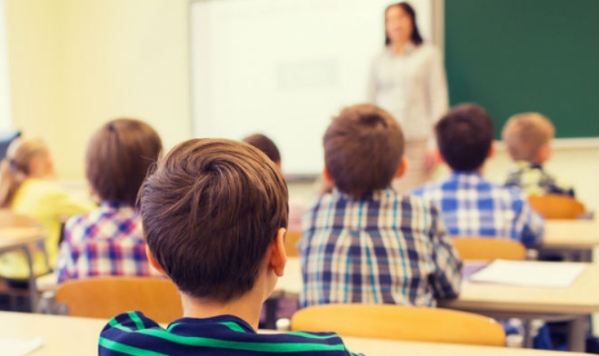Sam Drysdale
State House News Service
Department of Elementary and Secondary Education Commissioner Jeffrey Riley announced Tuesday that the department will “likely” create a matching grant program of up to $1 million for districts that pilot a cellphone restriction policy.
This is “not a mandate at this time,” he said, “but we’re certainly interested in piloting more of this.”
Riley invited teachers, administrators and students from schools that have instituted restrictions or bans to speak before the Board of Elementary and Secondary Education at their monthly meeting on Tuesday.
Some school representatives discussed their policies requiring students to give up their phones at the start of class. Other schools restrict phone use in hallways as well.
One school, the Eliot K-8 Innovation School in Boston, requires students to lock up their phones in magnetically-sealed pouches as they come in. Children can carry the encased phones, but the pouches can only be unlocked by a teacher or when students leave at the end of the day.
“Students get to actually feel that there is a phone in there, they just can’t actually open it,” said Eliot Executive Director Traci Walker Griffith. “For us it was this opportunity to build more opportunities for social interaction, both instructionally, academically, but the social-emotional needs that we needed from our students with each other.”
Walker Griffith added that “phones were not always part of school” — prompting an online response from Worcester School Committee member and field director with the Massachusetts Association of School Committees Tracy O’Connell Novick, who Tweeted, “There weren’t various kinds of automatic weaponry, either. So here we are.”
The Eliot School director said that in an emergency teachers have magnets in the classroom that unlock students’ phones from the sealed pouches.
Student reliance on devices has increased since COVID-19 lockdowns caused children to look to screens for social interaction and learning, educators said.
Gwyneth Zeeck, an 8th grade student at Eliot, said when school went back to being in-person she did not know how to make new friends, and spent most of her time with people she already knew or retreating into her phone. Zeeck said since the phone ban was instituted she has started interacting with new people and could focus on “figuring out who I was beyond that screen that had been our lives for a year and a half.”
But reducing academic and social distractions might not be as easy as taking away students’ phones — and some on the panel said total bans don’t allow students to learn how to use phones responsibly and practice self control.
“With all these different types of cellphone policies I think that students aren’t given the initiative to, kind of, restrain themselves and learn how to deal with distractions. They’re just being told, ‘Leave your phone there,'” said Alexander Sproule, a student at Concord-Carlisle High School. “I don’t necessarily think that all these students are learning good strategies to focus and study on their own without the distraction, because they’re so used to just being told, ‘Put your phone away.'”
Milford High School student Tessa Scrimgeour said not having access to her phone in class makes her crave more time with her device after school.
“Sometimes I get home I’m like, ‘Oh, I haven’t been on my phone all day. I just had two hours of sports, all I want to do now is lay down and watch TikTok,” she said, referencing a popular social media site.
Zeeck, however, said not being able to use her cellphone during school was “a wake-up call,” and has helped her learn to not be glued to the screen after returning to in-person school.
Education Secretary Patrick Tutwiler asked the panelists how other technology like Apple Watches — which are compatible with iPhones and get text message and social media notifications — fit into the phone bans.
Scrimgeour responded that some students at her school bought Apple Watches and MacBooks, which can also receive text messages, to get around the policy. She said schools would need to adapt to new technologies to continue to effectively ban distracting devices.
There was not much discussion about the possible advantages of cellphones in the classroom, though Board Chair Katherine Craven asked if there was “any thought given, though, to the phone as a pedagogical tool,” or “a pathway to more learning.”
Educators responded that teachers have the option to return students’ phones if they want to use them in a lesson.
 New Bedford Guide Your Guide to New Bedford and South Coast, MA
New Bedford Guide Your Guide to New Bedford and South Coast, MA









It’s about time!
Wow, you means kids in school should be learning. What genius thought of that. First you have to get the staff, stop using their phones all day. Long before covid, female teachers were keeping them in their bra. That’s right. Males and females would be so into swiping that when asked questions they just answered. Yet blamed the person speaking of miscommunication. What’s going to happen when students calculators run out of batteries and lap tops need a charge. They know nothing. Best thing to happen yet.